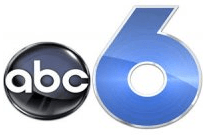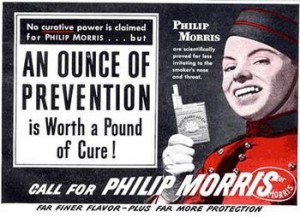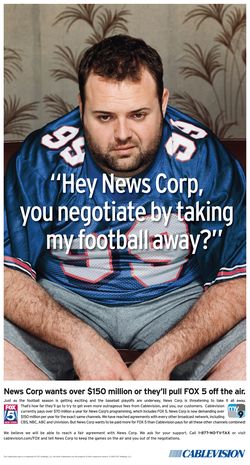![]() Sinclair Broadcasting is threatening to pull 33 television stations in 21 cities from Time Warner Cable customers on January 1st if the cable company doesn’t agree to demands to pay around 20-25 cents per month per subscriber for each of the stations, primarily Fox and MyNetworkTV affiliates.
Sinclair Broadcasting is threatening to pull 33 television stations in 21 cities from Time Warner Cable customers on January 1st if the cable company doesn’t agree to demands to pay around 20-25 cents per month per subscriber for each of the stations, primarily Fox and MyNetworkTV affiliates.
It’s just the latest in a series of retransmission rights battles underway between broadcasters and cable companies over cable carriage agreements.
Sinclair is a major group owner of television stations, and the impact on viewers in places like western New York, Dayton, Ohio, Greensboro, N.C., San Antonio, Tex., and Pittsburgh, Pa., won’t be missed because these markets have multiple Sinclair-owned or programmed stations involved in the dispute.
As always, the dispute is about money. This week, viewers of affected stations, including our readers Lance and Andrew, started being annoyed with repeated warnings scrolled at the bottom of screens about the potential loss of their “favorite stations.” In the case of WUHF, viewers might have thought a serious weather warning was being issued as text crawled against a distinctive red background.
So far, the dispute has not infected Sinclair’s local newscasts, which have often been used as a sounding board for the company’s past retransmission consent fights. But then, many Sinclair stations have abandoned producing local news themselves over the past few years as a cost-savings measure. However, many of the stations involved have put the dispute high on their home pages, as a too-cute-by-half link: “Learn About Time Warner Cable’s Plans to Drop Carriage Of This Station.” Sinclair leaves no doubt about who they blame for the debacle.
Stations Impacted
 AL Birmingham — WTTO (CW)
AL Birmingham — WTTO (CW)- AL Birmingham — WABM (MyNetworkTV)
- FL Pensacola — WEAR (ABC)
- FL Tallahassee — WTWC (NBC)
- FL Tampa — WTTA (MyNetworkTV)
 KY Lexington — WDKY (Fox)
KY Lexington — WDKY (Fox)- ME Portland — WGME (CBS)
- MO Girardeau — KBSI (Fox)
- NC Greensboro — WXLV (ABC)
- NC Greensboro — WMYV (MyNetworkTV)
- NC Raleigh — WLFL (CW)
 NC Raleigh — WRDC (MyNetworkTV)
NC Raleigh — WRDC (MyNetworkTV)- NY Buffalo — WUTV (Fox)
- NY Buffalo — WNYO (MyNetworkTV)
- NY Rochester — WUHF (Fox)
- NY Syracuse — WSYT (Fox)
 NY Syracuse — WNYS (MyNetworkTV)
NY Syracuse — WNYS (MyNetworkTV)- OH Cincinnati — WSTR (MyNetworkTV)
- OH Columbus — WSYX (ABC)
- OH Columbus — WTTE (Fox)
- OH Dayton — WKEF (ABC)
- OH Dayton — WRGT (Fox)
- SC Charleston — WTAT (Fox)
- SC Charleston — WMMP (MyNetworkTV)
 PA Pittsburgh — WPGH (Fox)
PA Pittsburgh — WPGH (Fox)- PA Pittsburgh — WPMY (MyNetworkTV)
- TX San Antonio — KABB (Fox)
- TX San Antonio — KMYS (MyNetworkTV)
- VA Norfolk — WTVZ (MyNetworkTV)
 WI Milwaukee — WVTV (CW)
WI Milwaukee — WVTV (CW)- WI Milwaukee — WCGV (MyNetworkTV)
- WV Charleston — WCHS (ABC)
- WV Charleston — WVAH (Fox)
Sinclair’s website warns viewers negotiations with Time Warner Cable are not promising:
Sinclair (or in some cases the licensees of the television stations not owned by Sinclair) and Time Warner are in the process of negotiating a renewal of the current agreement between Sinclair and Time Warner Cable which is scheduled to expire on December 31, 2010. Without a renewal, Time Warner Cable will no longer have the right to carry the broadcast of the television stations covered by this expiring agreement. Unfortunately, based on the status of the negotiations Sinclair does not believe we are going to be able to reach agreement on an extension of the deal. As a result, Time Warner would no longer be carrying the stations covered by the agreement with Sinclair beginning on January 1, 2011. Although some might try and characterize this as a dispute, in the end it represents nothing more than the failure of two companies to reach a business agreement, something that happens in the business world thousands of times a day.
 Taking a cue from News Corp., Sinclair claims Time Warner Cable is stalling, hoping the Obama Administration will intervene and prohibit signal blackouts while negotiations are still underway. Despite the claim the cable company is the one with the plan to drop stations, Sinclair informs viewers it is giving them early warning to help them make arrangements with alternative providers like Verizon FiOS, AT&T U-verse, or satellite companies to “avoid interruptions” in programming.
Taking a cue from News Corp., Sinclair claims Time Warner Cable is stalling, hoping the Obama Administration will intervene and prohibit signal blackouts while negotiations are still underway. Despite the claim the cable company is the one with the plan to drop stations, Sinclair informs viewers it is giving them early warning to help them make arrangements with alternative providers like Verizon FiOS, AT&T U-verse, or satellite companies to “avoid interruptions” in programming.
Time Warner Cable recognized the seriousness of the Sinclair dispute and has given it top billing on their Roll Over or Get Tough website. So far, the cable company has rolled over in every dispute, eventually caving to programmer demands. But the cable company would claim it has at least reduced the rates being demanded, or won concessions that allow subscribers to catch shows on-demand as part of its TV Everywhere project.
Because the cable industry has so far been dealt the weaker hand in these disputes, they are spending an increasing amount on lobbying the issue in Washington, right down to creating a front group that claims to represent viewers. The s0-called “American Television Alliance,” has a mission statement that, on the surface, doesn’t wade too deep into actual solutions:
The ATVA’s mission is a simple one – to give consumers a voice and ask lawmakers to protect consumers by reforming outdated rules that do not reflect today’s marketplace. We are united in our determination to achieve our goal: ensure the best viewing experience at an affordable price, without fear of television signals being cut off or public threats of blackouts intended to scare and confuse viewers.
 The overwhelming majority of the interests represented by the ATVA are giant cable and phone companies (and two groups willing to play along when sharing common interests: Public Knowledge and the New America Foundation.)
The overwhelming majority of the interests represented by the ATVA are giant cable and phone companies (and two groups willing to play along when sharing common interests: Public Knowledge and the New America Foundation.)
The group filed comments petitioning the Federal Communications Commission to modify retransmission consent policy to give cable and phone companies additional tools to battle with intransigent broadcasters. The most important, and one we agree with, is an end to the ban on importing distant network signals from nearby cities to replace those from local stations who simply dump “take it or leave it” offers on operators who then raise rates to cover ever-inflating programming costs.
As it stands now, cable systems cannot grab network stations from other cities to at least restore network programming, because FCC rules prohibit it, even if the nearby station doesn’t mind. While that might not help Time Warner viewers in cities like Rochester, where the nearby Fox affiliates in both Buffalo and Syracuse are also owned by Sinclair, the cable operator’s extended reach made possible serving all three major upstate cities might still deliver relief by grabbing further distant Fox stations like WYDC in Corning, WFXV in Utica, or WFXP in Erie, Pa and distributing them across all three affected cities.
Unfortunately, the Fox TV network has also made it clear stations could risk their affiliation deals with the network if they were to grant retransmission consent to providers that effectively undercut other Fox affiliates.
The ATVA also wants providers to retain the right to continue carrying disputed signals so long as good faith negotiations are ongoing, and has also suggested binding arbitration as another alternative reform. Broadcasters have rejected both.
Some of the ATVA’s proposals are worthy of merit to benefit consumer interests, but consumer groups might do better creating their own group to fight this issue, if only to keep broadcasters from dismissing the group as heavily stacked with cable and phone companies with a biased, vested interest in the outcome.
Just reviewing the FCC petition left a bad taste when they quoted everyone’s favorite “dollar-a-holler” group — the League of United Latin American Citizens, which continues to amaze with its omnipresent Zelig-performance in just about every telecommunications policy debate involving LULAC’s benefactors.
More than a few politicians are likely to accept broadcaster arguments, which would ultimately weaken the effectiveness of any reform effort.


 Subscribe
Subscribe







